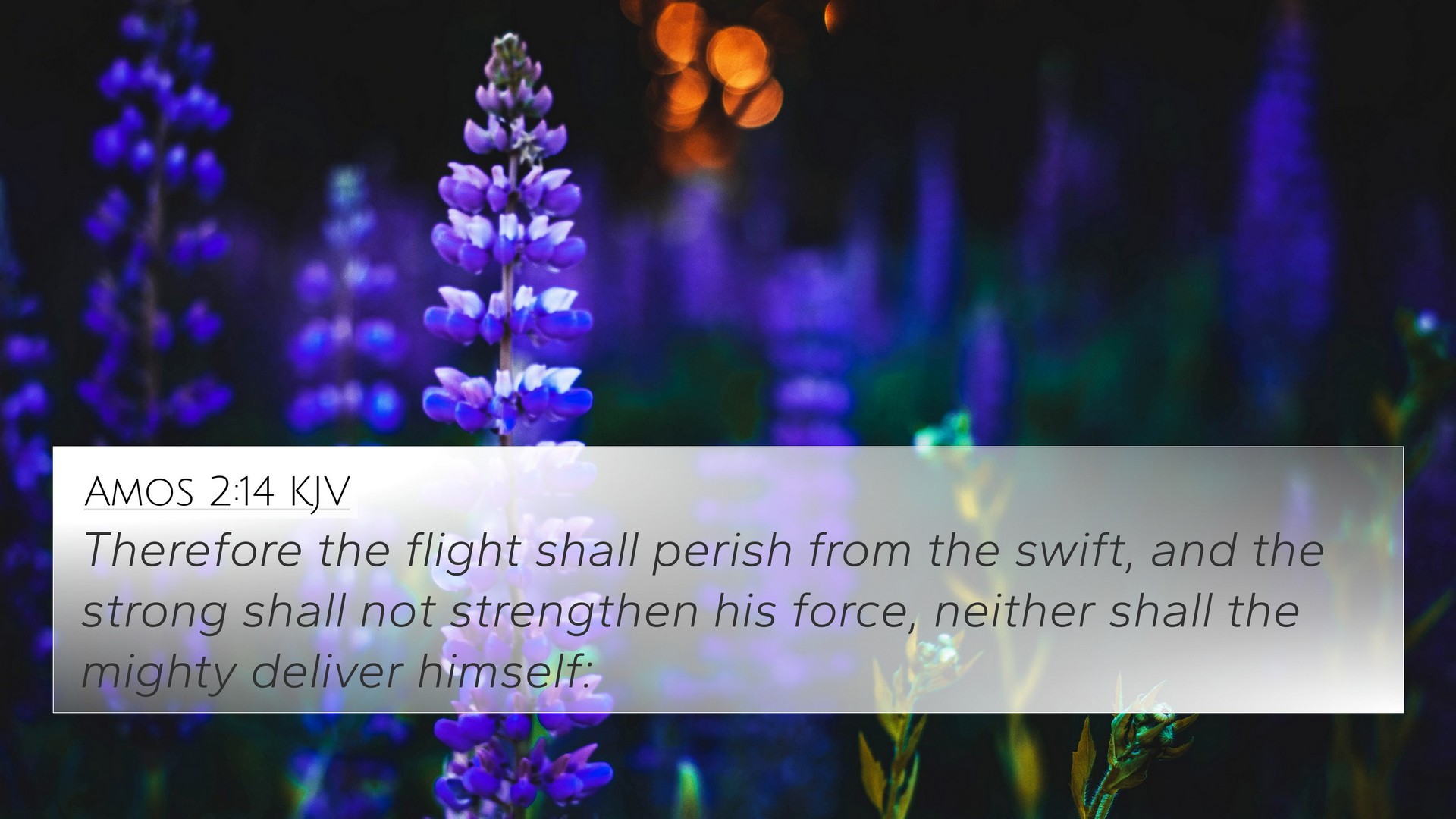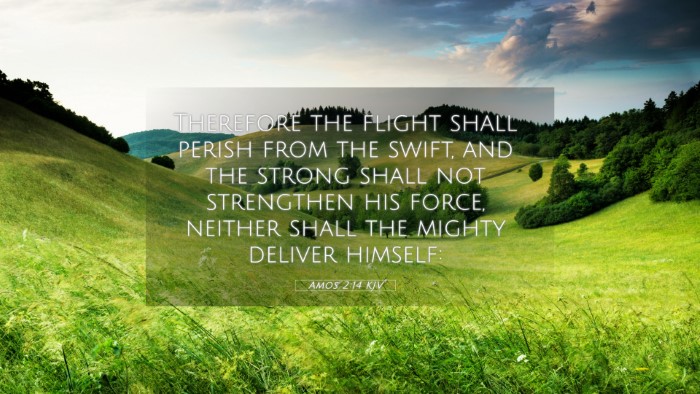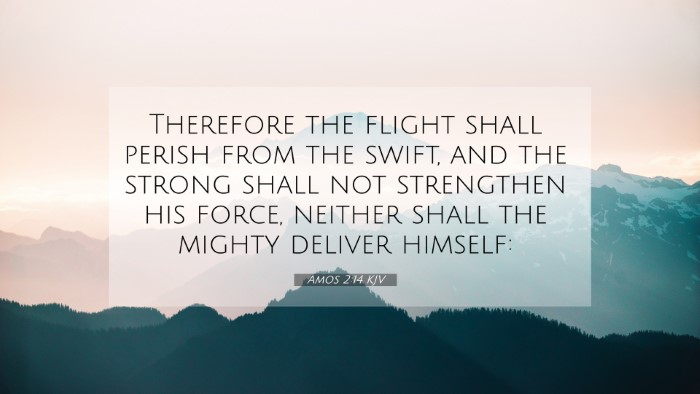Old Testament
Genesis Exodus Leviticus Numbers Deuteronomy Joshua Judges Ruth 1 Samuel 2 Samuel 1 Kings 2 Kings 1 Chronicles 2 Chronicles Ezra Nehemiah Esther Job Psalms Proverbs Ecclesiastes Song of Solomon Isaiah Jeremiah Lamentations Ezekiel Daniel Hosea Joel Amos Obadiah Jonah Micah Nahum Habakkuk Zephaniah Haggai Zechariah MalachiAmos 2:14 Similar Verses
Amos 2:14 Cross References
Therefore the flight shall perish from the swift, and the strong shall not strengthen his force, neither shall the mighty deliver himself:
Uncover the Rich Themes and Topics of This Bible Verse
Listed below are the Bible themes associated with Amos 2:14. We invite you to explore each theme to gain deeper insights into the Scriptures.
Amos 2:14 Cross Reference Verses
This section features a detailed cross-reference designed to enrich your understanding of the Scriptures. Below, you will find carefully selected verses that echo the themes and teachings related to Amos 2:14 KJV. Click on any image to explore detailed analyses of related Bible verses and uncover deeper theological insights.
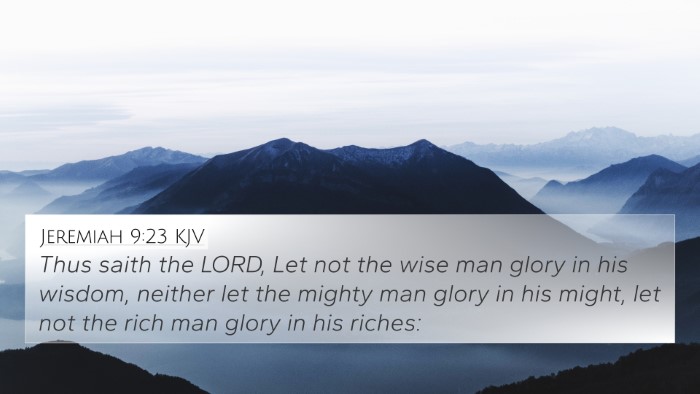
Jeremiah 9:23 (KJV) »
Thus saith the LORD, Let not the wise man glory in his wisdom, neither let the mighty man glory in his might, let not the rich man glory in his riches:
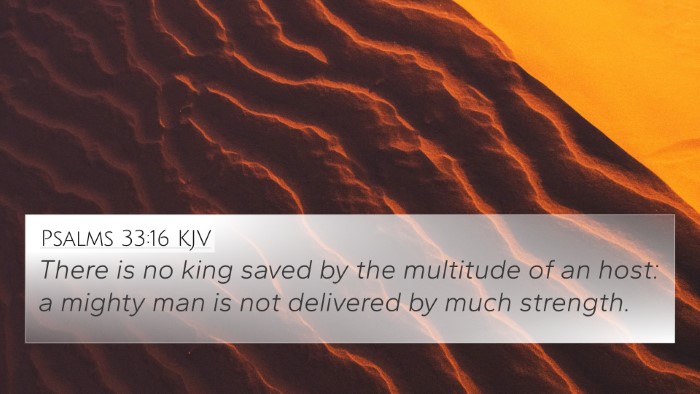
Psalms 33:16 (KJV) »
There is no king saved by the multitude of an host: a mighty man is not delivered by much strength.
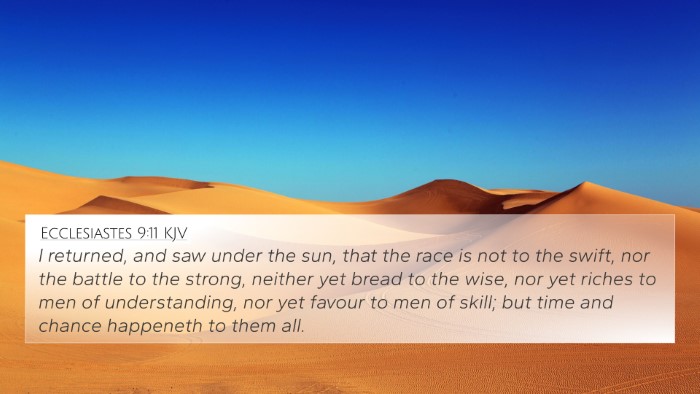
Ecclesiastes 9:11 (KJV) »
I returned, and saw under the sun, that the race is not to the swift, nor the battle to the strong, neither yet bread to the wise, nor yet riches to men of understanding, nor yet favour to men of skill; but time and chance happeneth to them all.
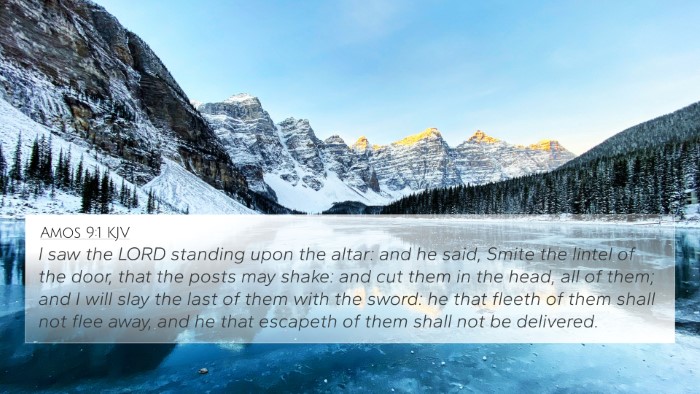
Amos 9:1 (KJV) »
I saw the LORD standing upon the altar: and he said, Smite the lintel of the door, that the posts may shake: and cut them in the head, all of them; and I will slay the last of them with the sword: he that fleeth of them shall not flee away, and he that escapeth of them shall not be delivered.
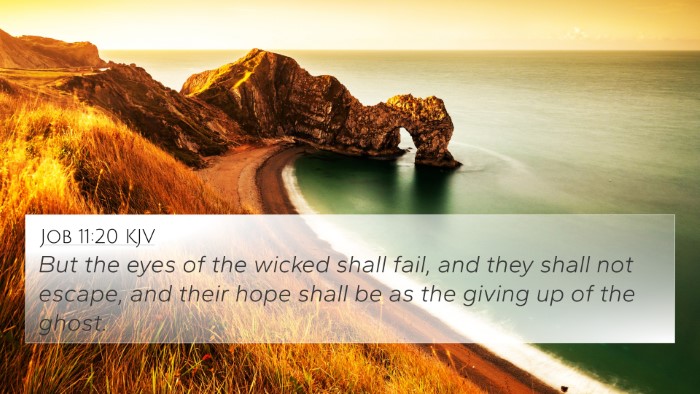
Job 11:20 (KJV) »
But the eyes of the wicked shall fail, and they shall not escape, and their hope shall be as the giving up of the ghost.
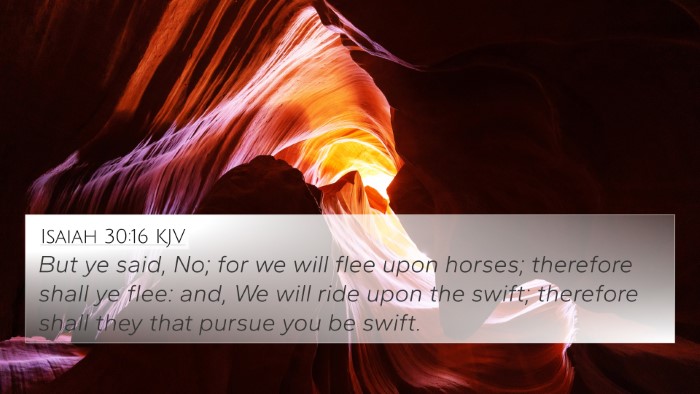
Isaiah 30:16 (KJV) »
But ye said, No; for we will flee upon horses; therefore shall ye flee: and, We will ride upon the swift; therefore shall they that pursue you be swift.
Amos 2:14 Verse Analysis and Similar Verses
Bible Verse Meaning: Amos 2:14
Verse: Amos 2:14 states, "Therefore the flight shall perish from the swift, and the strong shall not strengthen his force; neither shall the mighty deliver himself." This verse comes from a section where God, through the prophet Amos, pronounces judgments on Israel, emphasizing the inevitability of divine judgment and the futility of human strength without God.
Summary of Commentaries on Amos 2:14
This verse reflects deep theological truths regarding human limitations in the face of God’s judgment. The commentary insights reveal several themes:
- Human Inevitability: Matthew Henry notes that the futility of human strength in battle or escape is highlighted in this verse. Those who would seemingly have the capability to evade judgment will find themselves unable to do so.
- The Source of Strength: Albert Barnes emphasizes that without divine support, even the strongest among men cannot save themselves. Their strength will ultimately be powerless against the will of God.
- Divine Sovereignty: Adam Clarke observes that God’s sovereignty is absolute, and no human could avert His plans. This calls for a recognition of God's ultimate authority over individual and national destinies.
- Judgment Theme: The context indicates that Israel’s reliance on their own strength would lead to their downfall, as they have forsaken reliance on God.
- Historical Context: The historical background of Amos informs us that Israel was experiencing prosperity and security, leading to moral decay and complacency which God rebukes through Amos’ prophecies.
- Spiritual Implications: The spiritual implication signifies a need for humility before God. Those who believe in their own self-sufficiency must recognize their dependence on His mercy.
- Call to Reflection: Reflecting on these truths encourages readers to contemplate their reliance on God versus their own abilities and strengths.
Related Bible Cross-References
Amos 2:14 connects thematically and doctrinally with several other scriptures that echo similar sentiments on human strength, divine sovereignty, and judgment:
- Psalms 33:16-17: "The king is not saved by a mighty army; a warrior is not delivered by great strength. The war horse is a false hope for salvation, and by its great might it cannot rescue." This passage emphasizes the ineffectiveness of human strength in securing deliverance.
- Jeremiah 9:23-24: "Let not the wise man boast in his wisdom, let not the mighty man boast in his might, let not the rich man boast in his riches; but let him who boasts boast in this, that he understands and knows me…" The focus on knowing God rather than reliance on personal strength reflects a similar theme.
- Isaiah 40:30-31: "Even youths shall faint and be weary, and young men shall fall exhausted; but they who wait for the Lord shall renew their strength..." Here, divine strength is contrasted with human frailty.
- Proverbs 21:31: "The horse is made ready for the day of battle, but the victory belongs to the Lord." This proverb affirms that all human preparations amount to nothing without God’s involvement.
- Romans 5:6: "For while we were still weak, at the right time Christ died for the ungodly." This speaks to the sufficiency of Christ over human inability.
- Matthew 26:52: "Then Jesus said to him, 'Put your sword back into its place. For all who take the sword will perish by the sword.'" This illustrates the futility of relying on physical force as opposed to trusting in God's overarching plan.
- Isaiah 31:1: "Woe to those who go down to Egypt for help and rely on horses, who trust in chariots because they are many, and in horsemen because they are very strong..." This warns against misplaced trust in worldly resources rather than God.
- Luke 18:27: "But he said, 'What is impossible with man is possible with God.'" This highlights the contrast between human limitations and divine capability.
- Philippians 4:13: "I can do all things through him who strengthens me." While it conveys hope, the true source of strength is made clear.
- Job 13:25: "Will you frighten a driven leaf? And will you pursue the dry stubble?" Job’s plight illustrates the fragility of man in the face of divine scrutiny.
Conclusion
In essence, Amos 2:14 serves as a potent reminder of the limitations of human endeavor when faced with divine judgment. The combined insights from Matthew Henry, Albert Barnes, and Adam Clarke emphasize the critical importance of understanding our reliance on God rather than our own strength. Through cross-referencing with other scriptures, we can see a broader biblical narrative that emphasizes the futility of self-reliance and the greatness of God's sovereignty. This encourages believers to seek a deeper relationship with God, ensuring that their faith is rooted in His power rather than their own.
Further Study Suggestions:
For those wanting to explore more, tools for Bible cross-referencing such as a Bible concordance or Bible cross-reference guide can be invaluable. Engaging in cross-reference Bible study methods can reveal rich thematic connections, while a detailed comparative Bible verse analysis provides profound insights into inter-Biblical dialogue. Consider examining links between the Prophets and Apostolic teachings to enhance understanding of God’s plans through various scriptures.
